Christ is risen! Truly He is risen!
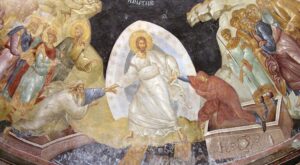
The Samaritan Woman
Text: John 4:5-42
You long-term readers: Yes, I know. I’ve written about the Samaritan Woman at least twice before. However, this is one of my favorite stories in all the Scriptures, and every time I hear it, I hear more in it. It was read at Divine Liturgy last Sunday … so, brothers and sisters, please humor me. I’m going to write about her once again.
Some Background
Saint John, in his account, tells us that after His early ministry at home in Galilee, where He gathered disciples, Jesus went up to Judea for the Passover. John says it was then that He drove the money-changers from the temple. (Or did He need to do it twice? People of that sort, like flies or lobbyists, tend to return quickly, don’t they?) It was there that Nicodemus came to Him by night. Afterwards the Lord went down to the Jordan and baptized with John. *
- This would make an interesting icon. Have any of you ever seen one? I have not.
In fact, the Gospel says that Jesus was Baptizing more people than John was. John accepted this with grace, but this was creating such a stir with the Pharisees that Our Lord decided to go back home. It was too early for Him to be arrested. He had a lot of work to do first. So it was on their trip north to Galilee that He took His disciples straight through… Samaria!

“Samaria? No! That’s not the way to go!” Jews did not associate with Samaritans. Samaritans were despicable lower class heretics. They accepted only the first five books of the Bible – the Law, the Pentateuch. They worshiped (and still worship) not on Mount Zion but on Mount Gerizim. They had so little value that the Babylonians didn’t bother taking them into Exile. Samaritans were… disgusting. * Good Jews traveled far out of their way – to the west along the Mediterranean, or to the east along the Jordan River, to avoid going through Samaria and taking the chance of having to speak to a Samaritan.
- To get the point, you may fill in here the sort of persons who maya be so revolting that you just do not want to deal with them…. a Trumper? a never-Trumper? a Jew? a Palestinian? an illegal immigrant? a conservative? a liberal? an evangelical? ?? There are so many possible choices these days!
John chapter 4:4: “Now He had to go through Samaria.” Why did He have to go through Samaria? It doesn’t say. Perhaps it was because the Pharisees would never get Him there. Or, according to the television series The Chosen, it was simply because He wanted to meet a certain Woman of Samaria.
A Long Digression about The Chosen

If you don’t know: This is the series about the life of Christ which looks like it may run for seven seasons.
I was turned off by The Chosen at first, because I thought its early episodes didn’t follow the Scriptures closely enough. Besides, I have despised movies and television programs about Jesus. I never found one that came anywhere near doing justice to Him. However, at the suggestion of our new Pastor at Saint Nicholas, whom I trust, my wife and I are giving it another shot.
After seeing five or six episodes, I like it very much. This is as close to the real Jesus as I can imagine. He is as Human as can be. He actually enjoys life! He laughed when Simon Peter drew in all those fish. How could He not? But it also shows Him revealing (and His disciples discovering, step by step, what they never imagined possible) that He is God, the Son of God, in the flesh. The extra-Scriptural episodes and dialog in The Chosen usually contribute to the reality of the Story. They suggest, for example, a possibility why Simon so quickly said: “Depart from me, Lord. I am a sinful man.” I’ve always wondered about that. Also The Chosen‘s portrayal of First Century Judaism is fascinating.
There are bound to be errors – unless I’m mistaken they have some of the chronology wrong – but there is much good about this series. So far I recommend it. I have loved my Lord Jesus for a very long time now – since the autumn of 1961, to be precise. He is the center of my life. The Chosen has drawn me even closer to Him.
Here’s what led me to include this Digression: In The Chosen, as Jesus heads into Samaria, His disciples go into a panic, as surely they must have. “Lord, we can’t go there! Those are Samaritans!” etc. etc. Jesus responds (this is not in the Scriptures): “If we’re going to have a big debate every time we do something unusual, we’re never going to get anything done!” I love that line. It speaks the truth. Sometimes we forget how very unusual – no, shocking – Our Lord Jesus was in His time. And, if we take Him seriously, in our time, as well.
“Are we ever going to talk about the Samaritan Woman?” cried the readers of this Post. Yes. Now.
In what follows here I’ll often paraphrase the conversation, lest this Post go on forever.
Jesus and the Woman of Samaria
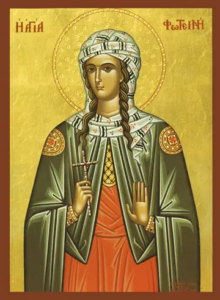
Jesus and His disciples come to Jacob’s well, just outside the town of Sychar.
“Jesus, wearied as He was with His journey, sat down beside the well. It was the Sixth Hour” – Noon, in our terms. Tradition held it was at the Sixth Hour that the serpent came to tempt Eve. The serpent’s work is now about to be reversed. Again. *
- The Virgin Mary had already begun the reversal.
The disciples are hungry, so they go into town to the ancient equivalent of McDonalds’ to get some lunch to bring back. Young John must have remained with Jesus. How else would we know this story in all its detail? (John recorded other dialogs, as you know: the man born blind, Nathanael’s conversion, and more. I’ve always wondered if Saint John was a frustrated dramatist.)
Meanwhile, a woman comes to the well, carrying large buckets to get water, as women did in those days – tough work. Why ever would she do that in the heat of the day? It was because the other women of the town did not want to associate with her kind.
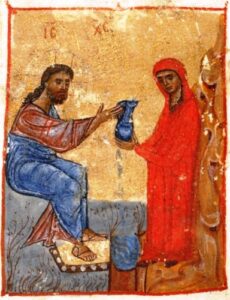
Jesus says to the woman “Give me a drink.” She is startled. “Why would you, a Jew, ask a drink of me, a Woman of Samaria?” – doing a double double-take. Jewish men did not speak with Samaritans, let alone converse in public with women. Jesus doesn’t give her a straight answer: “If you knew Who asked you, you would have asked Him and He would have given you living water” * – that is, fresh water, bubbling up in a fountain or running in a stream.
- Did you know that early Christians were always baptized in “living water”?
He has certainly caught her attention now. But there’s no “living water” around there that she knows of, so naturally she asks, “Sir, do you think you’re greater than our father Jacob who gave us this well?” Where would you get this “living water”?
Again Christ doesn’t give her a straight answer. He’s leading her somewhere else: “I can give you greater water than this – water so you will never thirst again, welling up to eternal life.” She doesn’t get the bit about eternal life. All she hears is “water”. Is this man a magician of some sort? Whoever he is, I’ll take it! “Sir, give me this water, so I will never thirst, nor come here to draw.” Wouldn’t that be wonderful?
Again, no straight answer from Jesus. I love this dialog: “Go, call your husband to come here.” “Sir, I have no husband.” “You said that right! You’ve had five husbands, and now you’re just living with a man.” You can imagine the shock on her face. When she recovers she gasps: “Sir, I perceive you are a prophet.”
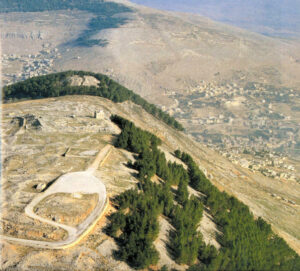
Now, she diverts the conversation. (Can you blame her? This was hitting too close to home.) What’s the perfect diversion from real life? Religion! Or perhaps she really wanted to know – for despite the woman she was, she turned out to be a woman of great spiritual depth. “Sir, our fathers worshiped on this mountain. You Jews say Jerusalem is the place to worship. Who’s right?” Now Jesus answers her directly: We Jews are right. “Salvation comes from the Jews” – as indeed He did. “But the hour is coming when true worship will be not on either mountain, but God will be worshiped everywhere in spirit and truth.” As He now is, all over the world. This was a new thing in the ancient world.
His answer left her, not surprisingly, displeased and also completely puzzled. “Well, the Messiah is coming. He will tell us everything.” And now comes the climax of the conversation. It is to this sinful Samaritan woman that our Lord Jesus Christ, for the first time, directly reveals His identity: “I who speak to you am He.”
Later in this passage, the Samaritan Woman runs into town crying, “He told me everything I ever did!” I’ve always wondered why she said that. He had told her she’d had five husbands and a live-in, but that wasn’t “everything” she’d done.
After He had identified Himself, the writers of The Chosen have her standing there wanting to believe Him, but still skeptical. He’s shown Himself to be a prophet – but why should I think He’s the Messiah? So He proceeds to list her husbands by name in order and tells a little about each! She stands there at first totally awestruck…. Then she runs into town crying “He told me everything…” almost believing but not quite: “Can this be the Christ?” Why should the Messiah reveal Himself to me, of all people?
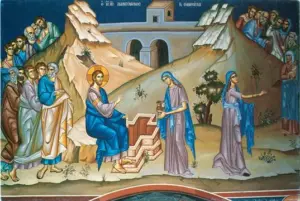
Neither do His disciples understand.
The disciples arrive: “Rabbi, here’s something to eat.” “I have food you don’t know about.” They ask innocently: “Has someone else brought Him food?”
Jesus goes on: “My food [what gives Me life] is to do the will of Him who sent me.” He continues overjoyed, exultant, at what has begun to happen, now that He has spoken plainly about Himself. The Great Harvest has commenced, and the fields are ripe for Harvest. He thinks back to all the previous generations who 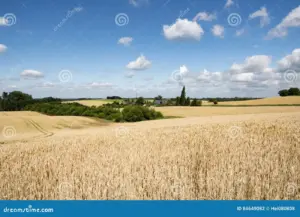 have prepared the way for this Day. He will soon send His Apostles out to proclaim the Good News, and then He looks far into the future: generation after generation of people, millions upon millions of men and women gathered into Eternal Life. He saw us, you and me, part of the Great Harvest, if we will have it, if we will have Him.
have prepared the way for this Day. He will soon send His Apostles out to proclaim the Good News, and then He looks far into the future: generation after generation of people, millions upon millions of men and women gathered into Eternal Life. He saw us, you and me, part of the Great Harvest, if we will have it, if we will have Him.
Did His disciples understand what He was talking about, why He was so filled with joy? – that Saint John doesn’t say. It was just about the last thing they had expected of this Man sitting alone by a well in the mid-day sun. But in time they would understand, and all of them would give their lives to it and for it.

The people of Sychar surely didn’t know what to make of this. Why would the Messiah be at the well outside town? But the woman was so excited, and not much unusual happens in small towns, so some of them went out to see. Whatever it was they saw (John didn’t tell us) caused them to ask Him to stay with them, which He did for two days. And they came to believe. Why? “Because of His word”, John wrote. What exactly did Our Lord Jesus say that convinced them? We’re not told that, either. Only that they said to the woman: “It is no longer because of your words that we believe, for we have heard ourselves, and we know that this is indeed Christ the Savior of the world.”
The Rest of the Story
… which is remembered in the Eastern Orthodox Church, but now is almost forgotten in the West.
The Samaritan Woman was baptized – some sources say in Jerusalem on Pentecost – taking the name “Photini” (pronounced “PhotinEE”) which means “Enlightened One”. She and her family, including her sisters and her children (I don’t know which ones by which husband) went on the road, telling how Jesus of Nazareth is the Savior of the world, leaving converts wherever they went. They finally settled in Carthage, North Africa.
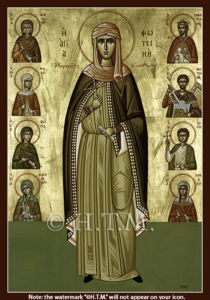
Details vary from source to source, but it seems one of her sons, Victor, was in the military, and while in Rome got into trouble for being a Christian and was being held in prison. So Photini, showing her usual enthusiasm, took the family and went to Rome to complain to the Emperor, uh… Nero. * He had the whole bunch of them killed, martyred. Some stories say he had Photini thrown into a well, just to make a point.
- As I’ve said before, there’s a moral: “Never complain to the Emperor Nero.”
Whatever the details, on February 26 each year and again on the Fifth Sunday after Pascha, the Holy Church celebrates The Great Martyr Photini, Equal to the Apostles. Who ever would have imagined that – on that hot Noonday when Jesus first spoke to that despised woman by Jacob’s Well?
There’s a moral here, too: Jesus of Nazareth knows what He’s doing. He still does. Follow Him. Trust Him.
Next Week: The Ascension – the Feast of Our Future
Week after Next: A Bizarre Doctrine